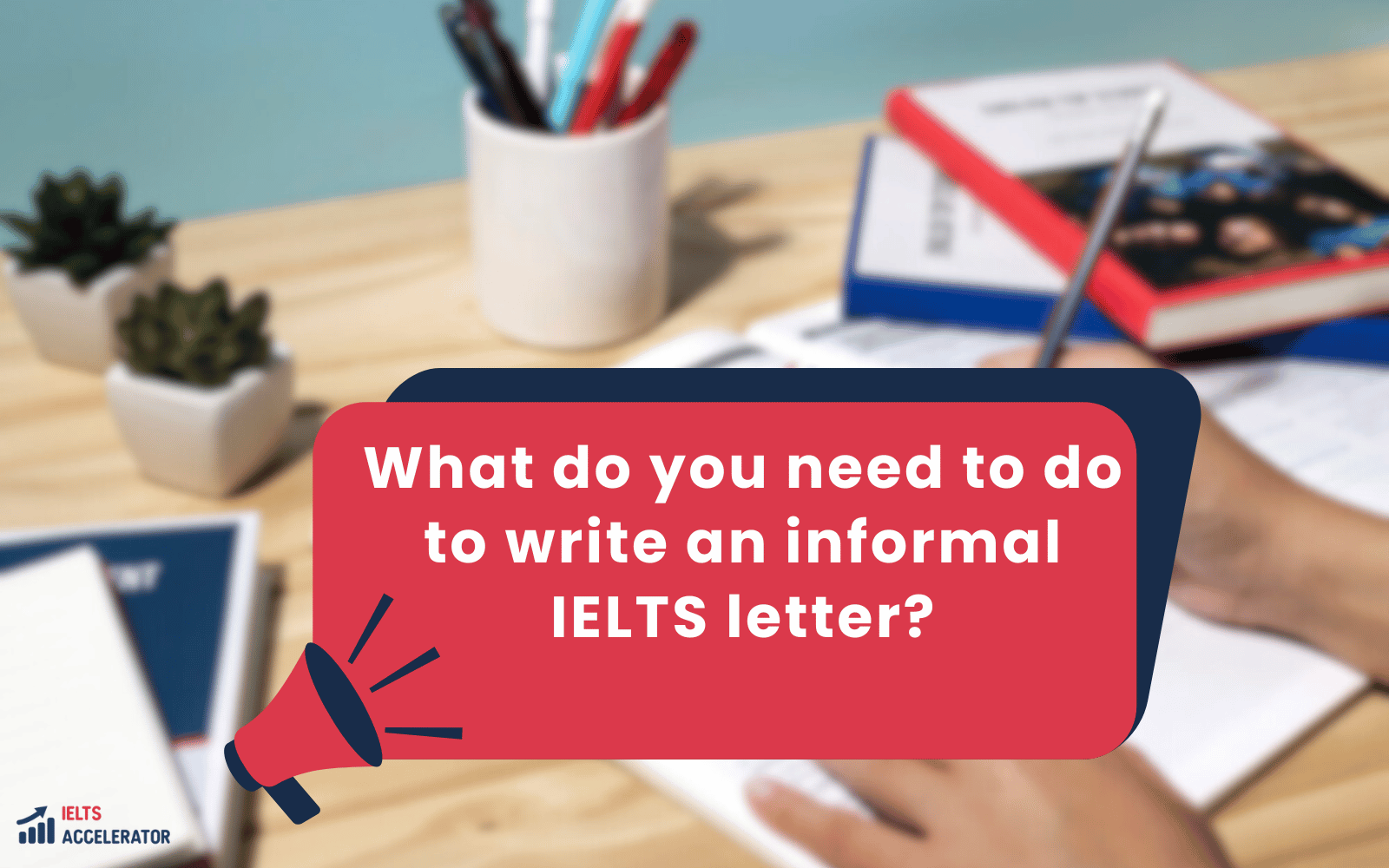” Write an informal IELTS letter ” If you are taking the General Training module of the IELTS exam, you will have to write a letter in the Task 1 Writing. This post is focused on how to write one, and will show you how to:
- to distinguish formal from informal writing
- develop a plan for your letter
- use a proper format
It will also provide you with:
- useful language
- a checklist you can use for all informal IELTS letters
- a band 9 sample answer
Formal or Informal IELTS letter?
The letter could be either formal or informal, depending on the instructions given, if the instructions ask you to write to “a friend,” then you should write an informal letter, in most other cases, you should write a formal letter. Let’s have a look at some example prompts:
[wptb id=10936]
[wptb id=10941]
“Register” with us and train to become a professional in 2 parts of ielts writing.
Can you tell which are formal or informal?
As you can see the first prompt is very clear, the question asks you to write to a friend so you will need to write an informal letter. In the second letter, again the answer is clear, but this time – there is no mention of ‘friend’ so you need to write a formal letter.
To know about “A Great Writing task 2 Plan For The IELTS Test” Go to this link.
Question Format for IELTS task 1
Now that we know how to identify an informal letter we need to work out how to write one. A good place to start is to understand the parts of the question, as you can see from the examples we just looked at always contains the following elements:
- who you are writing to
- why you writing the letter (the purpose of the letter)
- 3 bullet points
What this means is that we can use a set structure, which applies to any letter, when organizing, planning and writing for Task 1. So what kind of structure should we use?
The Standard Structure for IELTS Task 1
Many IELTS students do very little planning, if any at all, and if they do then it is normally not effective. For us, planning is a very important tool for success in the IELTS writing whether in writing Task 1 or writing Task 2, without it many people find themselves lost mid-way through their letter or essay which is often known as ‘writer’s block’. In other cases, students try to make sure their letter reads well and is properly organized while they are actually writing, where in fact what they need to do is simply plan properly from the start.
Dear [friend’s 1st name]
Paragraph 1
Paragraph 2 – 1st point from the question + detail
Paragraph 3 – 2nd point from the question + detail
See you soon,
Best of luck
[Your first name]
You can use this structure for any informal task 1 response, so there’s no need to alter it. Use it during your planning, BEFORE you write and then you will have a better idea of how to organize your ideas. Once this is done, you simply have to add your ideas to the different paragraphs.
What kind of informal language should I use?
When you are writing in informal language don’t forget that you still have to write with the best grammar and spelling that you can – don’t write as if you are chatting with a friend on social media, this will reduce your marks.
So that means not including abbreviations such as “luv”, “bcuz” or acronyms such as “LOL” or “OMG”. Obviously emoticons are definitely not to be used!
To help you reinforce the informal language you can use contractions such as ‘I’ve’, ‘you’d’ and ‘I’m’ to help demonstrate to the examiner that you can write informally.
Here is some informal language you can make use of to help you sound more informal – choose them depending on what kind of letter you are being asked to write.
Reason you are writing
- I’m actually writing to tell you that
- I’m writing to you because
Language for apologizing
- I’m really sorry to tell you that / about (what happened)
- I’m sorry for…
Expressing emotion
- I was absolutely delighted when I heard the news about….
- I was so happy to discover that…
Bad news
- I’m sorry to tell you there is some bad news.
End of the letter
- See you soon
- All the best
- Keep in touch
- Until next time..
Checklist
Here is a checklist that you can use to make sure that you have included the most important aspects of your writing.
- Am I certain that this is an informal question?
- Have I taken the time to understand the question properly? Have I given it enough consideration?
- Have I planned out my writing?
- Does my plan include the reason I am writing?
- Have I got enough relevant ideas for each point?
- Am I using too much of a casual tone, or is my language too formal?
- Have I stopped myself from simply repeating the words in the question?
- Do my thoughts make sense and is my writing easy for the examiner to read?
- Have I repeated the same vocabulary or have I used a variety of different words?
- Did I use paragraphs in the right places?
- Have I proofread my letter for grammatical, spelling and punctuation errors?





